|
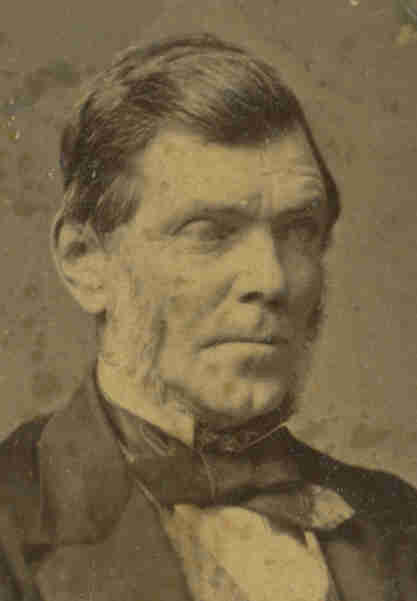
Alford 1872 (SLSA)
|
Unfortunately, during that same time there were some major problems in the police force, which in the end resulted in some members being suspended and others resigning, among them Henry Alford. The Register of 16 September, reported that, 'We were informed yesterday that this old and much respected officer of police had tendered his resignation, but the circumstances which led to that extreme step have not transpired.
Until all the facts of the case become known, we do not think it fair to comment on the matter, but cannot help expressing a hope that Mr. Alford's services may not be permanently lost to a department in which he has acquitted himself with so much credit'.
This was followed by a memorial to the Governor, signed by many of Adelaide's residents.
It stated, 'That we have heard, with deep regret, not unmingled with alarm, of the resignation of his situation in the police force of Inspector Alford. That we do not presume to say to your Excellency who is in fault; but from our long and intimate acquaintance with the ability, the zeal, the sobriety, the courtesy, and the efficiency of Inspector Alford, we think it essential to the preservation of the full public confidence in the police force, that his resignation should not he accepted without an investigation into the grounds on which he was led to tender his resignation.
We, therefore, pray your Excellency to institute such investigation. A copy of the above memorial lies for signature at the Exchanges, and at the office of this paper. Adelaide Times Monday 19 September 1853'.
Another letter to the Editor stated, 'Sir, On my arrival in town yesterday, on taking up your paper, I was extremely surprised to find that Inspectors Alford and Rose had tendered their resignations, and that Mr Inspector Stewart was suspended. The two former gentlemen, I remember, after a period of time extending over fifteen years, during which, I believe, their exertions in the apprehension of offenders against the law, justly procured for them the rank they lately held in the force, as well as the good opinion of the citizens, on account of their efficiency, zeal, and activity.
With respect to Mr Inspector Stewart, although he cannot boast of the same length of service, he may, I presume, merit public consideration, as a most active and efficient officer. Surely, Sir, there must be something wrong, very wrong, in the management of the force, when we find officers of their standing lost to that force, of which, when under charge of Major O'Halloran, Mr T. B. Finniss, and Capt. Dashwood, we were so justly proud.
It has this moment reached me that the Executive have refused to accept of Mr Alford's resignation, for which they are entitled to the best thanks of the public and if the current reports be correct, it is earnestly to be desired that, from whatever cause this to be lamented state of affairs has originated, his Excellency, on his return, will institute such an enquiry as will doubtless restore those efficient officers, and prevent any future like occurrence. I am, Sir, your obedient servant'.
On 29 October it was reported that Alford resigned simply because as an honorable and honest man, he could no longer hold his appointment. He had no alternative. Before his eyes, the Commissioner dismissed a man as a liar, whom Mr. Alford knew to have spoken the truth, and in support of whose statement he gave evidence. The colonists know his singleness of mind, his unobtrusive talents.
They are sure of their man; they know that he would neither lie nor second a liar, and they will acknowledge that the conduct of the Commissioner left him no other choice than to resign, for his word was doubted, and by implication he was in the same category as Corporal Balls. All we require is justice; we do not make charges against the Commissioner, neither, do we wish to pre-judge. the matter.
But in refusing to consider Mr. Alford's case, the Board have thrown over the evidence of a man whose word they could rely upon, and whose acquaintance with all parties concerned, must be considered as qualifying him as a most important witness. Mr. Alford's resignation, as we have seen, was not voluntary, but compulsory, and to leave him out of consideration simply because he told the Commissioner he must go, instead of Mr. Tolmer dismissing him with Corporal Balls, is a flagrant injustice certainly to him and as we expect, will be proved so to others.
After his resignation, Alford devoted himself to a great extent to amateur gardening. By his generous disposition and geniality, he made also numerous friends in all classes of society. Before long he went into business and on 29 March 1854 announced to his numerous friends in town and country, that a licence has been granted to him for the Stag Inn on the corner of Rundle Street and East Terrace. The position of the Stag Inn was in his opinion 'a pleasant and advantageous place which was commodious, and set up with a due regard to the comfort of his guests'.
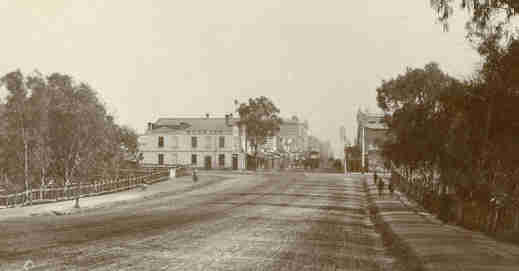
Stag Inn 1884 (SLSA) |
The premises included 'good Stabling, Stockyards, and other conveniences, with sufficient space for any augmentations or improvements which increase of business may call for'. As Alford had been favourably known to South Australians during his many years of arduous pubic service, he believed it scarcely necessary for him to say that 'he would endeavour to exercise, as a good citizen, the principles which, as a public officer, had procured him the general approbation of his fellow-colonists'.
By the middle of 1855 he still found time to make himself available for election for the position of Town Councillor of the Hindmarsh Ward. However, six months later, the workload had increased and he advertised for the service of a young lad. In June 1856 he transferred his licence to Walter William Waite and took up the Glynde Inn at Glynde.
In October 1857 Henry Alford was in the news again, this time the Adelaide Times published a lengthy article about his treatment by Parliament.
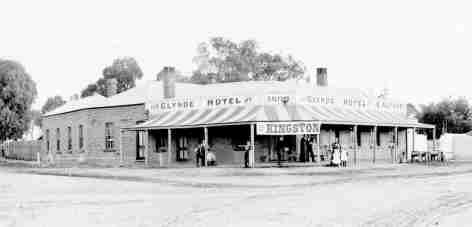
Glynde Hotel 1901 (SLSA) |
MR. HENRY ALFORD'S CASE.
Fair play is a jewel, and this should be accorded to every man, whether in the public service, or not. But this, we fear, has been denied to some extent to the gentleman whose name stands at the head of this article.
Mr Alford's case is briefly this. For many years, he was a most active, energetic, and efficient police officer, and was ultimately raised, on the score of his merits, to the rank of Inspector. Differences with Mr Tolmer, then the head of that department, drove him out of the force, and he petitioned the House of Assembly in July last for such a sum to be placed on the Estimates, in the shape of a retiring allowance, as might appear to honorable members a sufficient and proper recognition of his past services.
This petition was referred, on the 4th of August, to a Select Committee, consisting of Messrs Hay, Scammell, Mildred, Burford, Dunn, Smedley, and Waterhouse, and they brought up their Report on the 9th of September, declaring the undesirableness of placing Mr Alford on the Retiring or Superannuation Fund, but suggesting the propriety of awarding him a bonus of 250 pounds 'for past services, and in testimony of the approbation of the House of the good conduct of the Petitioner before he was compelled to resign his appointment of Inspector of Police'.
So far all was plain sailing. The Select Committee's Report, with the evidence on which its recommendation was based, was before the House, and it was for that House, in its collective capacity, to deal with it as honorable members thought most fitting. The result was, that they ignored the Committee's recommendation, by refusing to adopt the report.
But mark the sequel, and learn from this by what means the House were thus led to fly in the face of the Select Committee's recommendation. After the Report had been brought up, Mr Alford met Mr Finniss, and asked him, when the adoption of the Report was moved, as an old Commissioner of Police, under whom he had long served, to support his case. To this, Mr Alford distinctly understood Mr Finniss to assent.
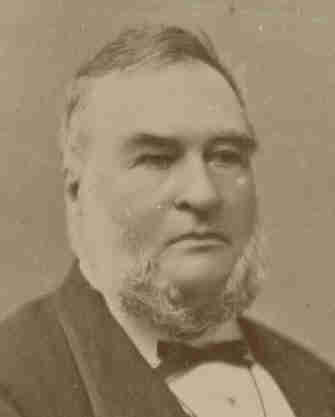
BT Finniss (SLSA) |
But in the course of conversation, Mr Finniss asked Mr Alford, whether he was then prepared to accept another appointment under Government, to which Mr Alford replied, that, as he was now in business, he should require some little time for consideration. Such, at all events, are the facts of the case, as reported to us, but should we in any respect have been misled, we shall be ready at any moment to make the necessary correction.
Now, were this all we had to say on the subject, we should never have put pen to paper about it. But there is a principle involved in it, to which we attach some importance, and it is this. When a matter is once referred to a Select Committee, and they have brought up their Report upon it, there should be very grave reasons indeed for the introduction of anything extraneous, and not to be found in their Minutes of Evidence, for opposing its adoption.
But no such reasons, as it seems to us, existed in this case. The Report was thrown out, mainly on the Attorney-General's representation of a conversation between Mr Finniss and Mr Alford, some days after the Report was brought up, but the strict accuracy of which Mr Alford challenges. This it is, that led us to say, at the outset, that fair play had hardly been accorded to Mr Alford, and whether it has so or not, we now leave our readers to determine.
We impute no blame to Mr Hanson, or to any other gentleman, who took part in the discussion, which led to the rejection of the Committee's Report, and with that their recommendation of an award of 250 pounds to Mr Alford, but we could not avoid calling attention to what we think would be a very unsafe and a very unwise precedent, namely, that of allowing mere verbal reports, of casual conversations, in any case, to over-ride solemn facts given in evidence before a Select Committee appointed by the House, and especially where those verbal reports have reference to casual conversations, which are alleged to have taken place after the Committee's Report has been signed and brought up, and has lain for some days on the table of the House.
In May 1858 another committee was formed to look into Alfords and Tolmer's claims. They too deliberated endlessly but made no final decision. Meanwhile, both men went on with their lives. In 1858 Henry Jr took up the running of the Red Lion hotel in Rundle Street and Alford transferred his hotel licence to Sylvester Badman as he wanted to retire due to his wife ill-health. Alford now had to look for somewhere to live and advertised for tenders to build a cottage for his family in Kent Town.
A few months later Tolmer finally was awarded a hundred pounds in July 1859, but no word yet on Alford's case. For him there was only bad news. To make matters worse his daughter Mary Ann died on 10 August 1859 of diphtheria, aged only five years. Early in 1860 Alford took up the licence for the Golden Rule Inn in Pirie Street and his son Henry became the landlord of the Glynde Hotel.
Soon after, on the 4th July, at the residence of the bride's father, by the Rev. T Q Stow, Henry, eldest son of H Alford, was married to Miss Mary Davis, second daughter of Samuel Davis from Glynde. They too were to have six children.
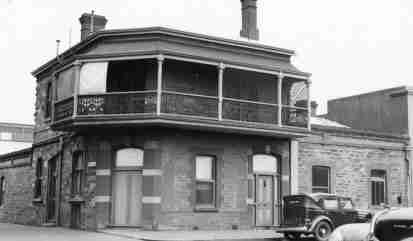
The one-time Golden Rule Inn (SLSA) |
Although busy with his hotel, Alford was still interested in horse racing, local politics and copper and gold mining. He was one of the original lease-holders of the Blinman and Yudanamutana mines. On 14 March 1860, he wrote a letter to the editor of the Register about the Snowy River goldfields, which read, Sir, If the accounts concerning these diggings are correct, another exodus will take place; in fact, I think it has already commenced. Things are at a standstill, and our towns, villages, and farms deserted.
Many will leave, taking with them their wives and families, whilst others will never return to these shores, but become permanent settlers in Victoria or New South Wales. To afford an inducement to such persons not to break the ties that bind them to South Australia, I respectfully suggest the re-establishment of the gold escort. That escort ought not to have been abolished; it was the only link which bound us to our fellow colonists in Victoria and as soon as it was determined to stop it, they came over or sent for their wives and children, and Victoria and New South Wales have now the honour of enrolling many hundreds of them amongst the lords of the soil there.

John Baker (SLSA) |
I believe the depression which now exists, and which has existed for some years past, dates its commencement from the period when it was determined by Parliament (through Mr. John Baker) to abolish the escort service, which at that time was annually enriching us, by bringing into Adelaide thousands of ounces of gold, thereby increasing sales of land, giving employment to all classes, and enhancing our prosperity to a degree beyond the conception of those who were not then here to witness it.
That escort paid its own expenses, and left a profit to the Government sufficient to cover all risks and, even had it been conducted at a loss, it should, for the good of all, have been continued. Assuredly the crisis is rapidly approaching, and South Australia will once again experience the loss, of many valued colonists. Trusting that our new Parliament will give attention to the suggestion thrown out, I am, Sir, &c., H. ALFORD, Late Inspector of Gold Escort.
As it turned out, many men and some families did leave for the new goldfields, but the numbers were nowhere near those of the early 1850s gold rushes in Victoria or New South Wales.
In September 1860 Alford took over the licence of the Glynde Hotel which his son had run for the past six months. He once again showed concern for the public safety and the environment. In July 1861 at the local council meeting, the attention of the Board was requested to the dangerous character of a tree on the roads near Alford's corner, where four cross roads met.
It was then stated that Alford had kindly allowed his hotel-lamp to be kept burning all night, or there might have been some serious accidents happen there, Mr Williams said that some of the inhabitants looked upon the tree as an old friend, while others wanted it removed. After some arguing it was resolved that as no accident had ever taken place the case should be regarded as exceptional. The inhabitants of the district were the best judges as to its removal or otherwise. After some further discussion it was resolved not to remove the tree.
In August 1862 Alford went up to the northern Flinders for an inspection tour of some of the mines in which he was financially interested. On his return from the Yudanamutana district, about 220 miles north of Port Augusta, he kindly provided reports on the Welcome Mine, the Stanley, the Old Nol's, the Sir Dominic Mine and the Daly Mine. Alford also stated 'that teams are very much required to convey the ore to Port Augusta, there being hundreds of tons at grass at the mines with which he was connected and others in the district waiting to be carted away'.
Three years later, in August 1865, Alford once again acquired the publican's licence for the Golden Rule Hotel in Pirie Street. He had also been busy organizing the Glynde Races for 31 August. They were reported as a very spirited series of horse-racing which came off at the Glynde. The ground selected for the events was the fine level piece of road running from the Glynde Hotel to Kensington, and answered the purpose admirably.
The day was superbly fine, and the knowledge that some really promising colts and fillies would be there to contest the course, drew an exceedingly large concourse of people to the spot. Host Henry Alford, with his usual foresight and desire to please everybody, made every arrangement which could possibly be suggested for the accommodation and entertainment of the crowds which sought his offices in his hotel, and, we believe none went away disappointed.
The winning-post was a few yards west of the hostelry, opposite to which seats were placed for the accommodation of the ladies and children. He certainly tried to attract as many customers to his hotel as possible. Only a few weeks later he organized a Mowing Match for the 6th of November, at 11 o'clock, opposite his hotel. The crop which would be operated upon by the scythes of the competitors was one of the finest around Adelaide.
It was calculated to yield two tons to the acre. The contest no doubt was a very interesting one, and Alford with his usual forethought, had provided for the accommodation and entertainment of a large concourse of visitors expected to witness the event.
**************

If you would like to find out more,
please go
to home page for more information.
Thank you for visiting South Australian History,
We hope you enjoy your stay and find the information useful.
This site has been designed and is maintained by FRR.


|





